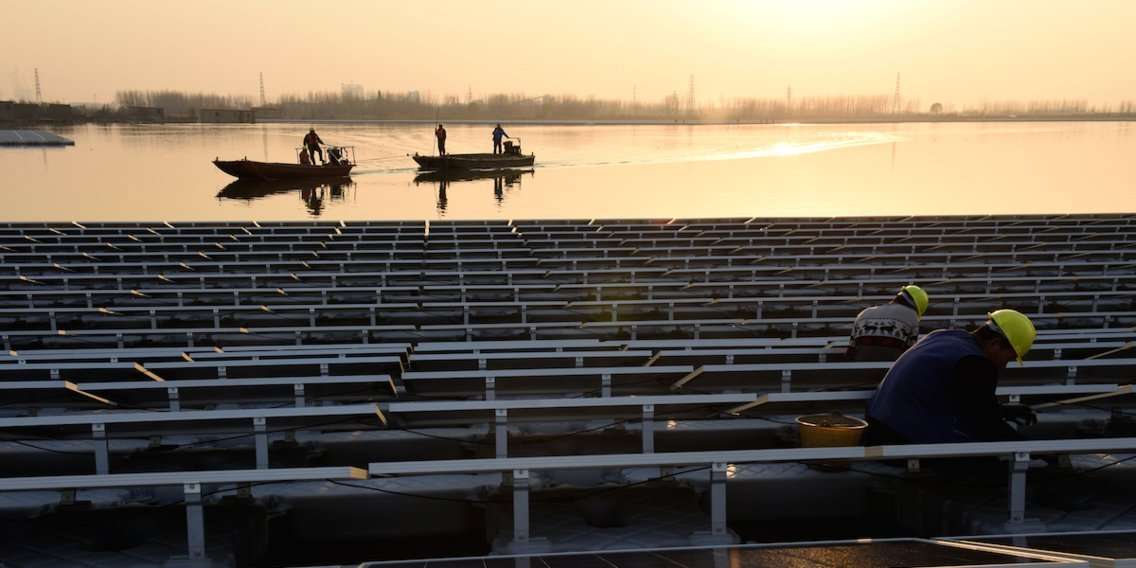The cost of solar power is declining. Reuters
The cost of solar power is decreasing so rapidly, it's now cheaper than coal, based on a new analysis.
A recent report from Lazard shows how the costs of producing electricity from various sources are changing. Energy from utility-scale solar plants — plants that produce electricity that feeds into the grid — has seen the biggest price drop: an 86% decrease since 2009.
The cost of producing one megawatt-hour of electricity — a standard way to measure electricity production — is now around $50 for solar power, according to Lazard's math. The cost of producing one megawatt-hour of electricity from coal, by comparison, is $102 — more than double the cost of solar.
The dramatic change is clear in this chart:
Lazard's analysis is based on a measurement known as the levelized cost of energy analysis (LCOE), which is a way of calculating the total production cost of building and operating an electricity-generating plant.
The rapidly declining cost of solar is a sign that the world may be on the verge of a dramatic change in how we power our buildings and vehicles. The price drop is likely to spur a shift toward renewable power sources like wind and solar and away from fossil fuels like oil and coal.
Changing our energy system to emphasize those clean sources is the only way to slow the process of climate change, since emissions from fossil fuels cause more heat to get trapped on the planet. But analysts have long pointed out the transition will only realistically ramp up once renewable energy sources become cheaper than traditional fuels — which now seems to be happening.
The rise of renewables is apparent when you look at which types of new energy generation capacity are getting added around the world. In 2017, there was m ore new solar power capacity created than any other type of energy, according to a report from the United Nations Environment Programme.
Renewable energy, including wind, hydro, and solar, supplied a record 12% of the world's energy needs last year. In 2017 alone, the solar sector attracted $160.8 billion in investment, an 18% increase over 2016, according to the UNEP report.
While solar is getting much cheaper, Lazard notes that these sources of electricity are not a panacea. LCOE as a measurement does not take into account some external costs, like storing solar power for cloudy days, which is one of the lingering obstacles preventing the widespread adoption of solar. (Other sources of electricity like coal or natural gas don't have the same problem, of course.)
That storage problem also makes it hard for developing economies to adopt energy systems that are fully renewable. Until battery and storage capabilities improve, the report says, countries will likely need to use a mix of traditional energy sources along with renewables.
In the US, solar still only provides 2% of the country's total electricity needs, according to the Solar Energy Industries Association. But California is trying to change that: The state is seeking to mandate that most new homes be outfitted with solar panels. State lawmakers are scheduled to vote on the proposal on Wednesday.

762mm_Labradors on October 15th, 2018 at 22:54 UTC »
Use to work for a power company 10 years ago. At that time, it cost us around $55 to produce 1MWh of electricity burning coal. Natural gas was around $110. We only ran our natural gas plant during emergencies because it was too expensive. It was cheaper to buy power out of state then spin up our natural gas plant.
dsf900 on October 15th, 2018 at 22:13 UTC »
What this entire thread will be can be summed up in table 2 of this EIA report:
https://www.eia.gov/outlooks/aeo/pdf/electricity_generation.pdf
Solar is a highly location-specific technology. The cheapest places to build solar are very cheap, but other places traditional generation is cheaper.
Mechasteel on October 15th, 2018 at 22:09 UTC »
People complain about solar subsidies, blissfully ignoring the amount of subsidies coal has gotten over the years (which includes research, and also influences mass-production related costs). Yeah and license to pump the air full of CO2 without compensating those harmed by this is also a subsidy.